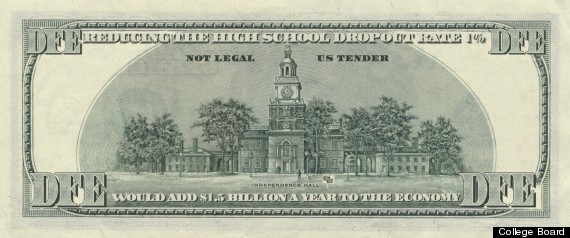
NEW YORK -- While cash and Wall Street go hand-in-hand, the College Board is hoping that a 6-foot-tall display of (fake) hundred-dollar bills placed near the Stock Exchange on Wednesday morning will stop one of the more apathetic breeds of pedestrian, commuters in downtown New York.
The display, the next step of the organization's "Don't Forget Ed" campaign, will represent the $1.5 billion annually that professor Henry Levin of Teachers College has calculated would be added to the economy by reducing the dropout rate by 1 percent. College Board staffers hope to tell passersby more about their efforts and sign them up for the cause.
The goal of the campaign, organizers say, is to raise the profile of education in the presidential election. "Education is one of these issues where it seems like every four years it's going to be the year that education is treated as a top-tier issue in the presidential campaign, but it falls away as the campaign heats up," says Peter Kauffmann, the College Board's communications chief.

The College Board plans to install a six-foot-high collection of these fake 100-dollar bills in downtown Manhattan to highlight education and the dropout crisis.
This year, the primary campaign debates featured very few questions about education, which has left voters unclear about the Republicans' specific platform on the issue. Since then, emerging Republican candidate Mitt Romney gave an address about education that was light on details, and has yet to circle back to the topic. President Barack Obama hasn't campaigned extensively on education, although he does mention his record on schools in his stump speeches, and he dispatched Vice President Joe Biden to talk to both national teachers' unions this summer.
"On the campaign trail, education isn't treated as a tier-one issue," Kauffmann said. "But it's the type of issue that affects everything else: It's the foundation of our economy and national security, and if we don't get it right, everything else starts to crumble."
The awareness campaign's website includes a petition to be presented to candidates. It has also conducted a survey of swing state voters and produced PSAs featuring former New York City Schools chief Joel Klein and Merone Tesfaye, a graduating New York high school senior. So far, 3,042 people have signed up to partake in the "social media rally" that will coincide with the installation.
The installation, which is set to be placed at the intersection of Broad Street and Exchange Place, follows a similar stunt in June: 857 empty school desks placed on Washington, D.C.'s National Mall to represent each student who drops out of school every hour of every school day, according to Education Week's 2007 calculations.
The College Board, which brings students nationwide such exams as Advanced Placement and the SAT, is funding the campaign internally, and Kauffmann would not say how much cash it had to spend on the initiative. Aside from wanting "education to bubble up as a tier-one campaign issue," when asked specifically about metrics for success, Kauffmann said the campaign had "no goals, none that I would want to share." He added that the campaign had no specific policy agenda.
But some are skeptical of the drive's aims. "I don't think getting people to say they care more about education has any meaningful impact on the quality of schools or on kids' lives," said Frederick Hess, a conservative education scholar whose work is often published by the American Enterprise Institute. "What's much more useful is helping them understand particular propblems and putting forward actionable solutions." Hess said he had not heard of the Don't Forget Ed campaign.
There is historical evidence on the efficacy (or lack thereof) of similar campaigns. "I don't think this kind of stuff makes a difference," Hess said. "They should have learned that from Ed in '08," referring to the 2008 campaign run by the foundations of Bill Gates and Eli Broad. Ed in '08 had specific policy stances and spent $25 million working behind the scenes with campaigns to push its agenda and place debate questions, to little effect.
"People say they care a lot about education, but then don't care beyond the school that their kid goes to, and then it sort of ends," said Alexander Russo, an education blogger who recently wrote about Ed in '08 for AEI. "They're dealing with a very distracted world now."
Kauffmann said Don't Forget Ed differs in that it has a much smaller budget, and that it's a more general campaign to put education on the political map.
Cutting through the noise will be hard, says Andy Rotherham, an adviser at consulting firm Bellwether Education, who served in the Clinton White House. "What's driving the election is economic pressure," Rotherham said. "If you don't have a job, you're a lot less likely to be concerned with reducing the dropout rate by 1 percent."
And, he added of the campaign, "It's good advertising for the College Board."